Abstract
In 1993 New York and Texas each reported a human rabies case traced to a rare variant of rabies virus found in an uncommon species of bat. This study examined the epidemiology of bat rabies in New York State. Demographic, species, and animal-contact information for bats submitted for rabies testing from 1988-92 was analysed. The prevalence of rabies in 6810 bats was 4.6%. Nearly 90% of the 308 rabid bats identified to species were the common big brown bat (Eptesicus fuscus), which comprised 62% of all submissions. Only 25 submissions were silver-haired bats (Lasionycterus noctivagans), the species associated with the two 1993 human cases of rabies, and only two of these bats were positive. Rabies was most prevalent in female bats, in bats submitted because of human [corrected] contact, and in animals tested during September and October. These results highlight the unusual circumstances surrounding the recent human rabies cases in the United States. A species of bat rarely encountered by humans, and contributing little to the total rabies cases in bats, has been implicated in the majority of the indigenously acquired human rabies cases in the United States. The factors contributing to the transmission of this rare rabies variant remain unclear.
Full text
PDF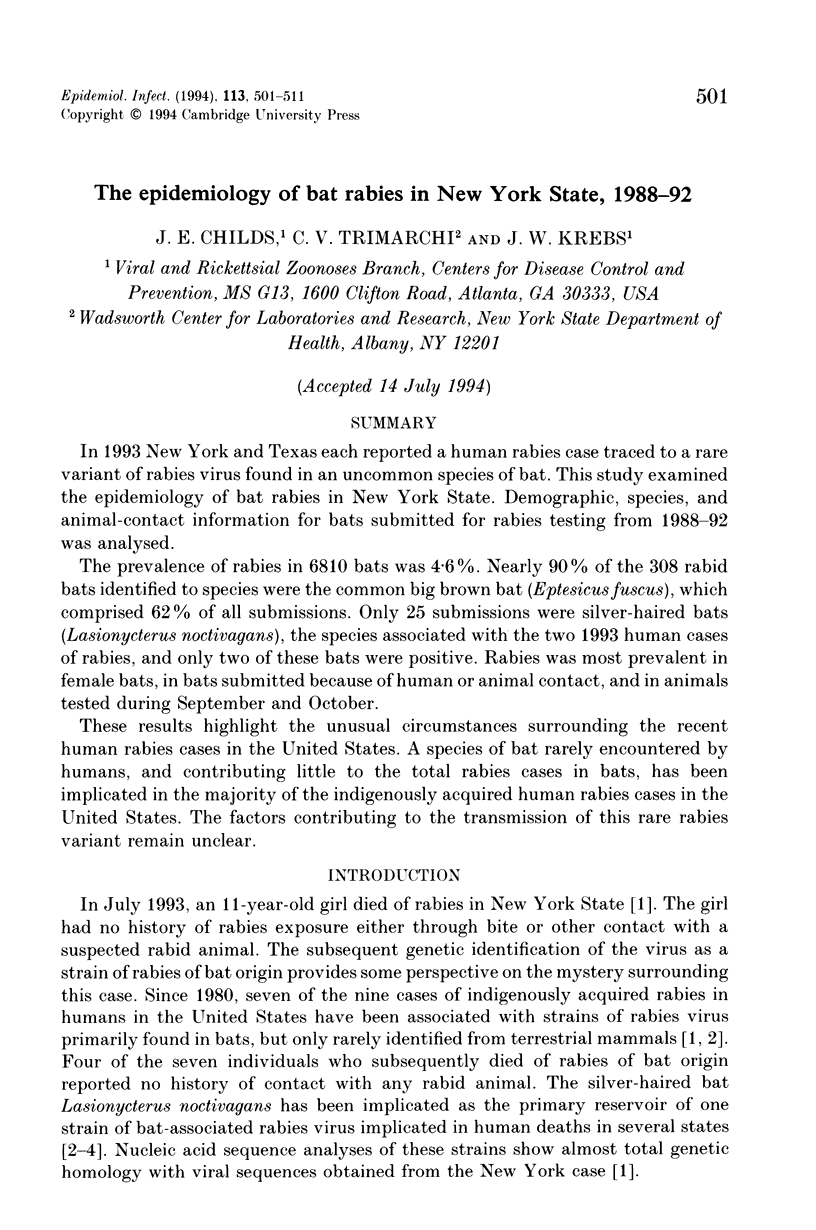
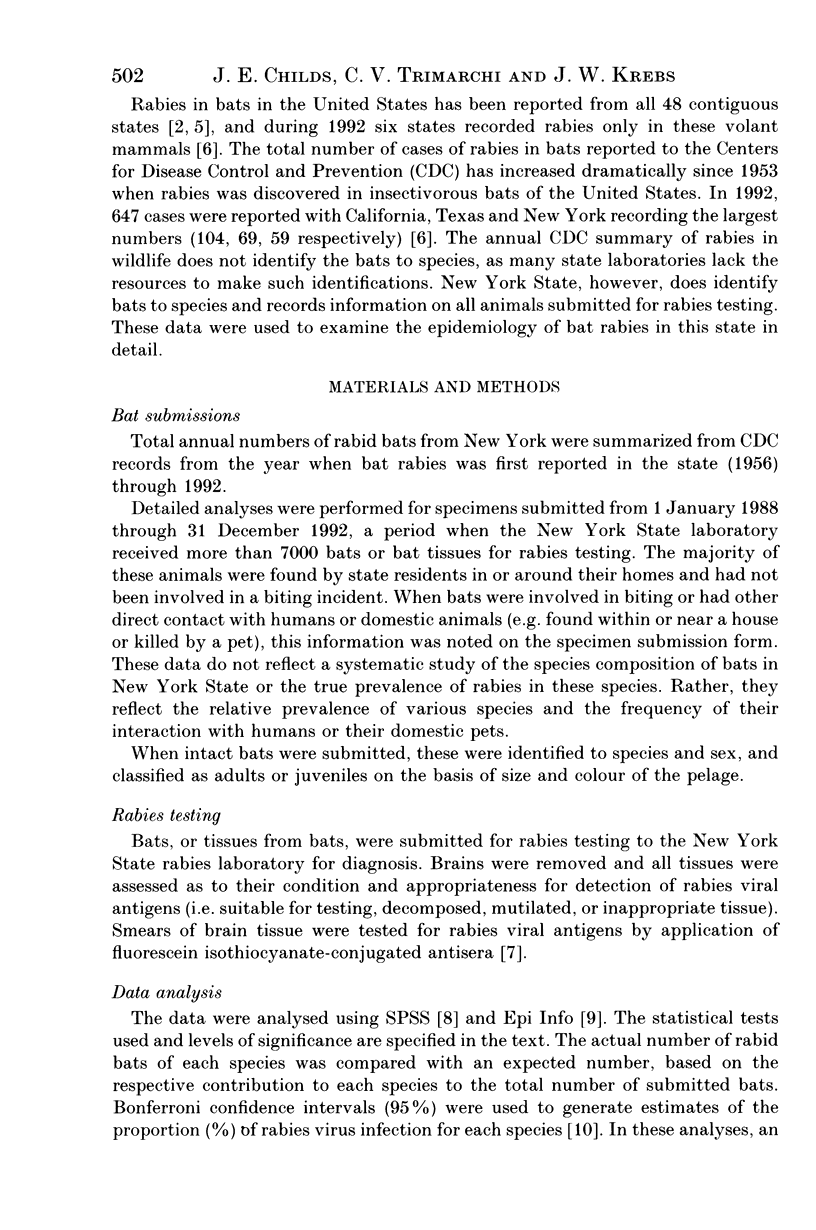
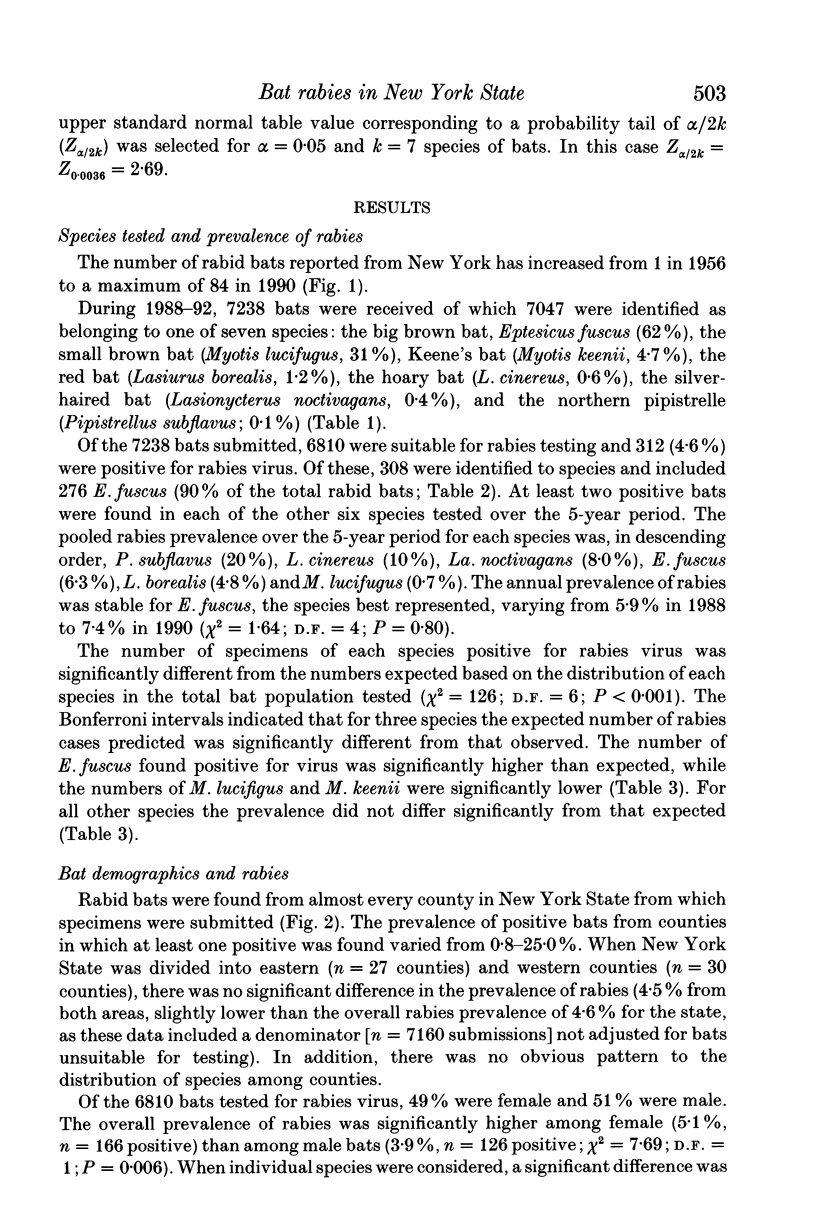
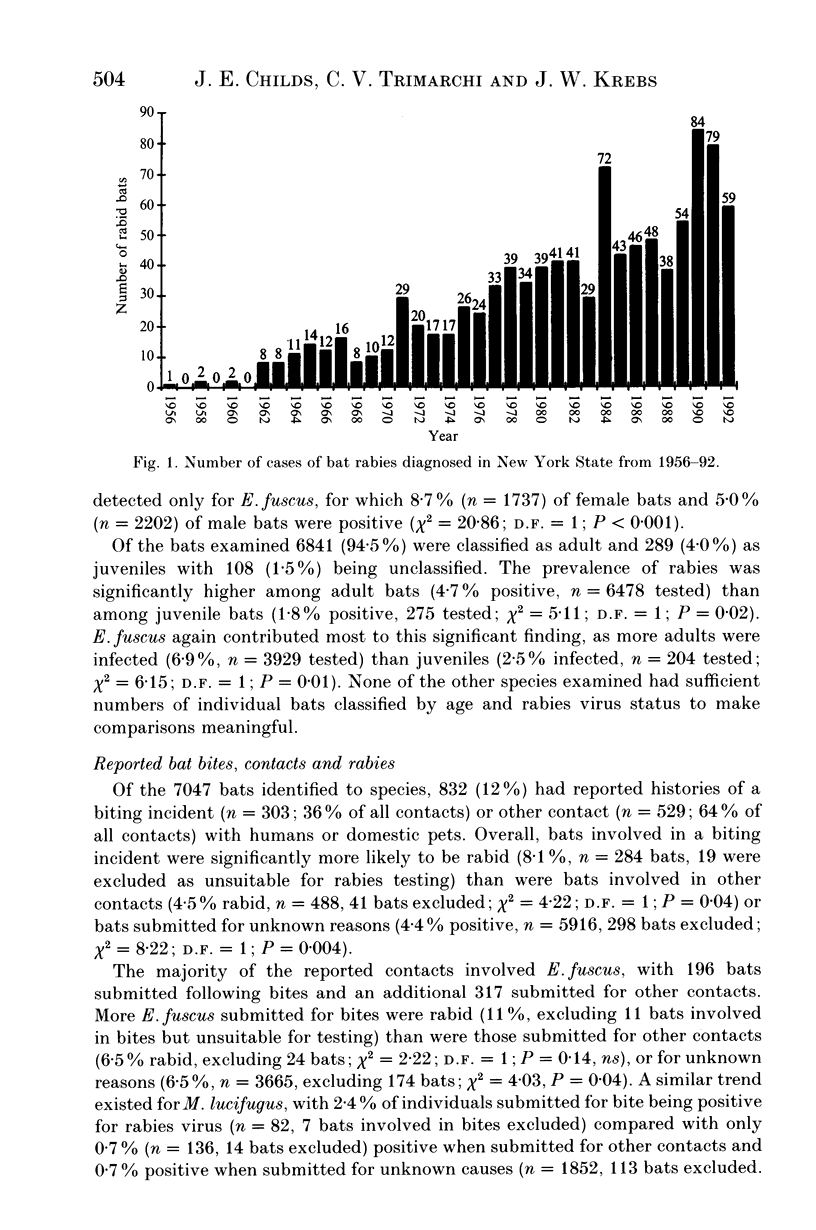
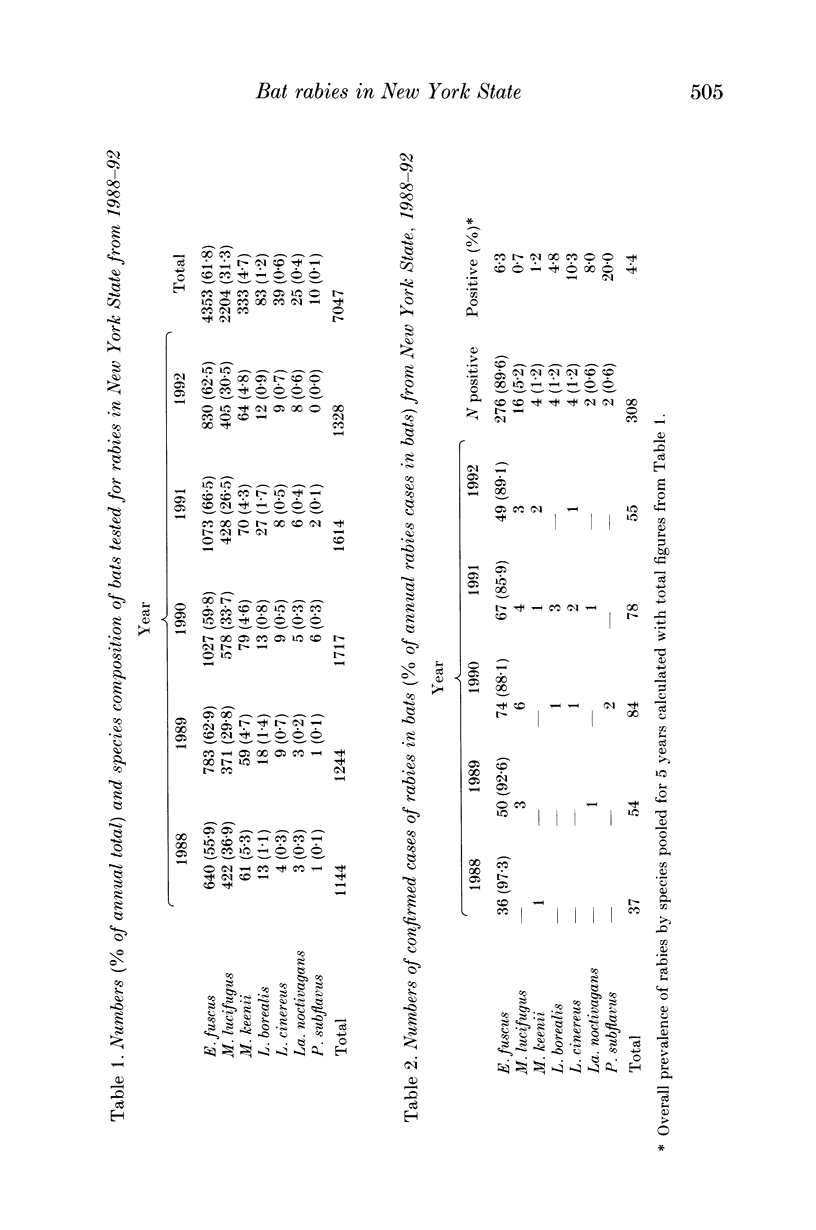
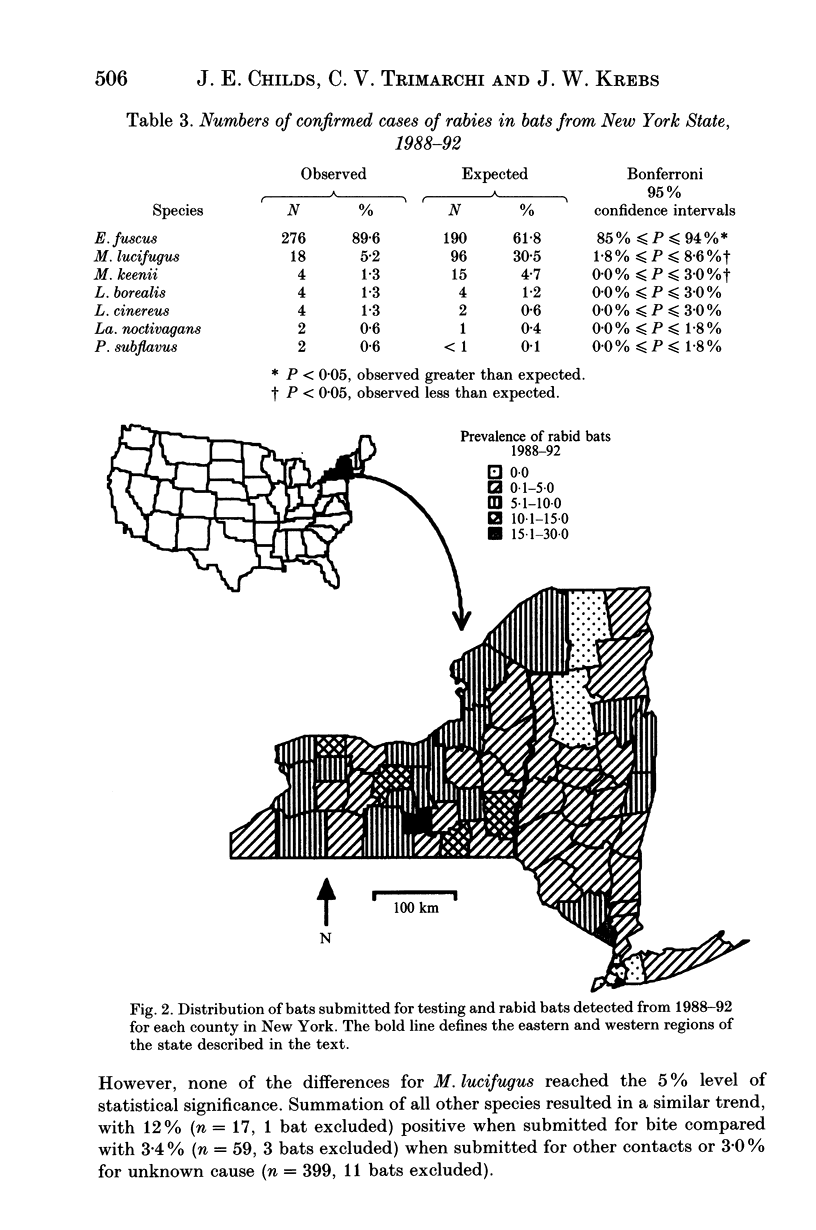
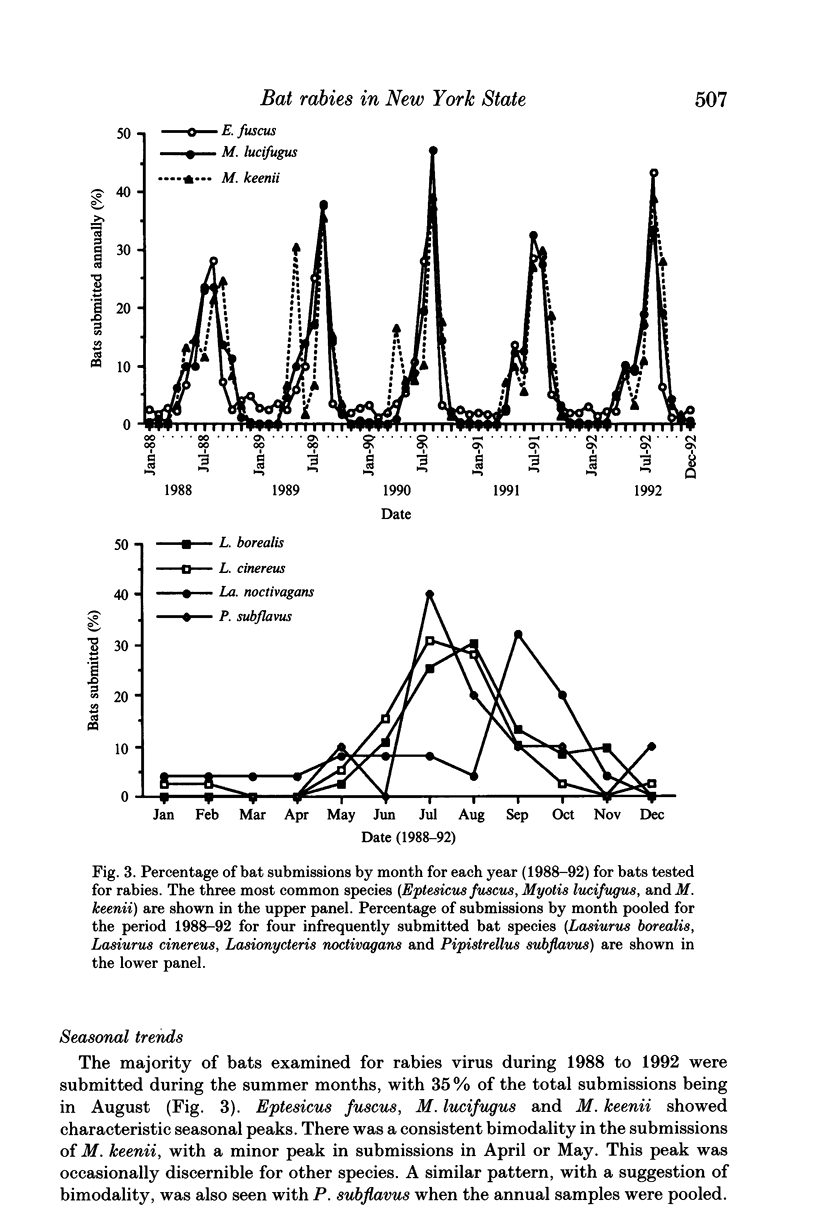
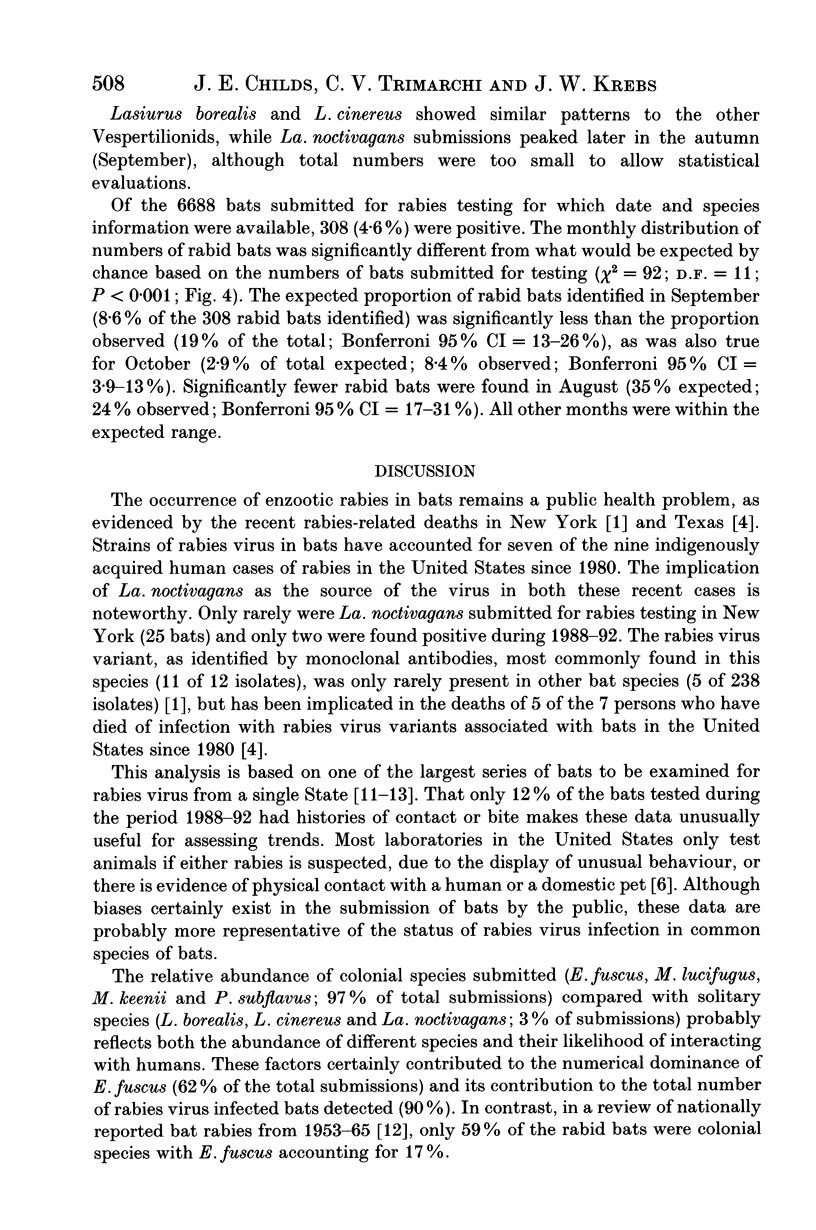
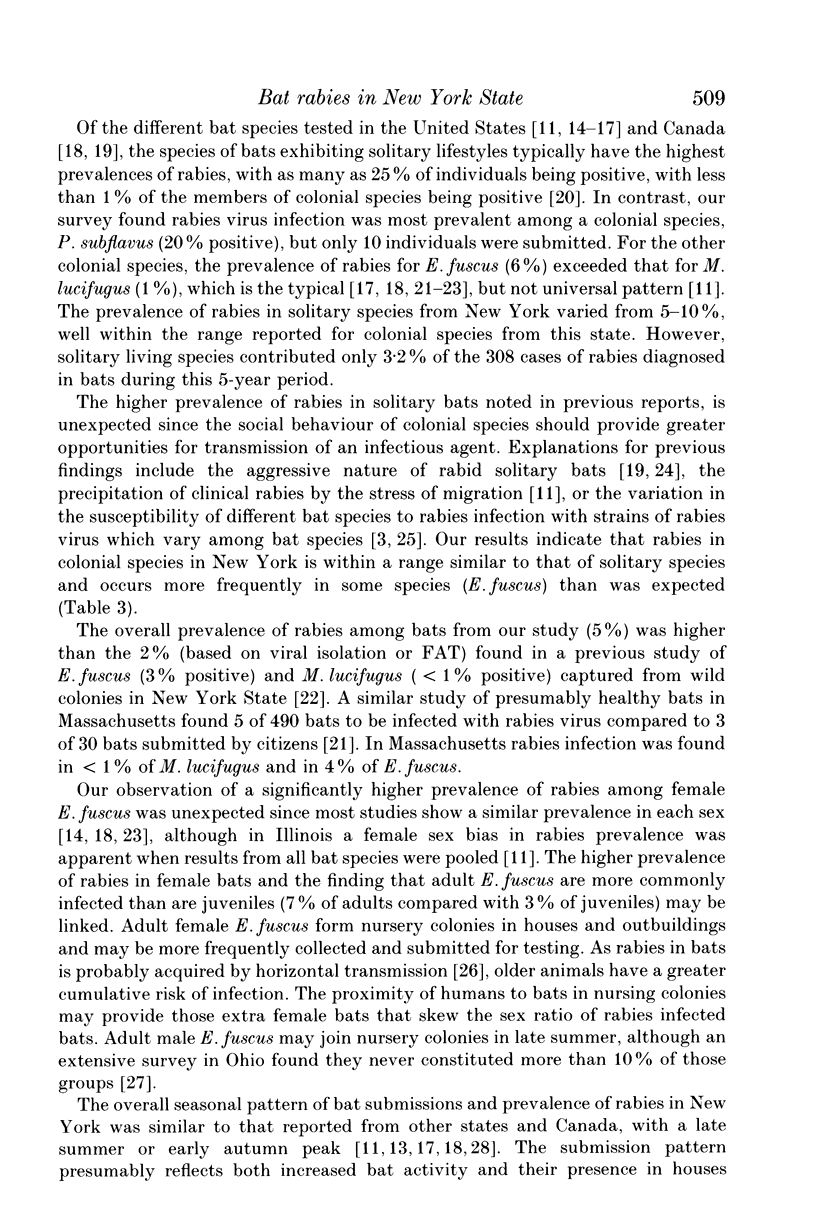
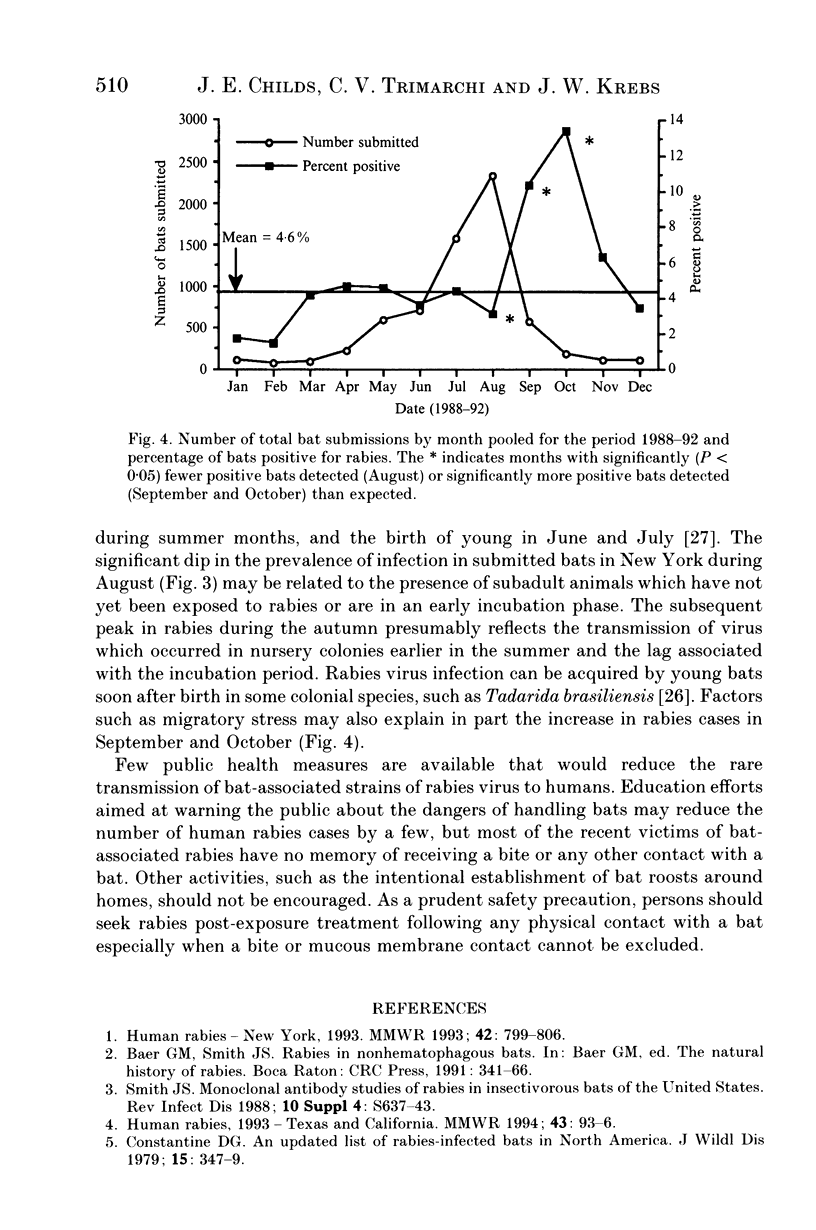
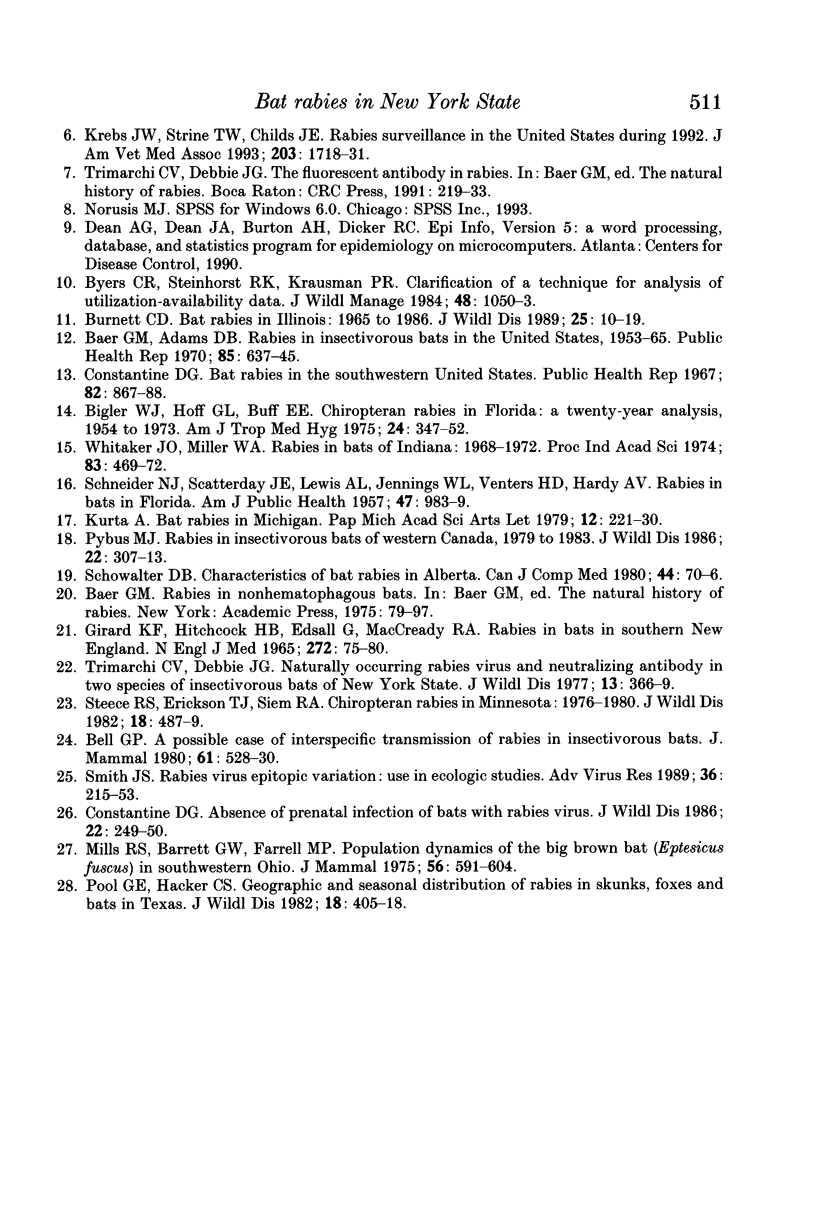
Images in this article
Selected References
These references are in PubMed. This may not be the complete list of references from this article.
- Baer G. M., Adams D. B. Rabies in insectivorous bats in the United States, 1953-65. Public Health Rep. 1970 Jul;85(7):637–645. [PMC free article] [PubMed] [Google Scholar]
- Bell G. P. A possible case of interspecific transmission of rabies in insectivorous bats. J Mammal. 1980 Aug;61(3):528–530. [PubMed] [Google Scholar]
- Bigler W. J., Hoff G. L., Buff E. E. Chiropteran rabies in Florida: a twenty-year analysis, 1954 to 1973. Am J Trop Med Hyg. 1975 Mar;24(2):347–352. doi: 10.4269/ajtmh.1975.24.347. [DOI] [PubMed] [Google Scholar]
- Burnett C. D. Bat rabies in Illinois: 1965 to 1986. J Wildl Dis. 1989 Jan;25(1):10–19. doi: 10.7589/0090-3558-25.1.10. [DOI] [PubMed] [Google Scholar]
- Constantine D. G. Absence of prenatal infection of bats with rabies virus. J Wildl Dis. 1986 Apr;22(2):249–250. doi: 10.7589/0090-3558-22.2.249. [DOI] [PubMed] [Google Scholar]
- Constantine D. G. An updated list of rabies-infected bats in North America. J Wildl Dis. 1979 Apr;15(2):347–349. doi: 10.7589/0090-3558-15.2.347. [DOI] [PubMed] [Google Scholar]
- Constantine D. G. Bat rabies in the southwestern United States. Public Health Rep. 1967 Oct;82(10):867–888. [PMC free article] [PubMed] [Google Scholar]
- GIRARD K. F., HITCHCOCK H. B., EDSALL G., MACCREADY R. A. RABIES IN BATS IN SOUTHERN NEW ENGLAND. N Engl J Med. 1965 Jan 14;272:75–80. doi: 10.1056/NEJM196501142720204. [DOI] [PubMed] [Google Scholar]
- Krebs J. W., Strine T. W., Childs J. E. Rabies surveillance in the United States during 1992. J Am Vet Med Assoc. 1993 Dec 15;203(12):1718–1731. [PubMed] [Google Scholar]
- Pool G. E., Hacker C. S. Geographic and seasonal distribution of rabies in skunks, foxes and bats in Texas. J Wildl Dis. 1982 Oct;18(4):405–418. doi: 10.7589/0090-3558-18.4.405. [DOI] [PubMed] [Google Scholar]
- Pybus M. J. Rabies in insectivorous bats of western Canada, 1979 to 1983. J Wildl Dis. 1986 Jul;22(3):307–313. doi: 10.7589/0090-3558-22.3.307. [DOI] [PubMed] [Google Scholar]
- SCHNEIDER N. J., SCATTERDAY J. E., LEWIS A. L., JENNINGS W. L., VENTERS H. D., HARDY A. V. Rabies in bats in Florida. Am J Public Health Nations Health. 1957 Aug;47(8):983–989. doi: 10.2105/ajph.47.8.983. [DOI] [PMC free article] [PubMed] [Google Scholar]
- Schowalter D. B. Characteristics of bat rabies in Alberta. Can J Comp Med. 1980 Jan;44(1):70–76. [PMC free article] [PubMed] [Google Scholar]
- Smith J. S. Monoclonal antibody studies of rabies in insectivorous bats of the United States. Rev Infect Dis. 1988 Nov-Dec;10 (Suppl 4):S637–S643. doi: 10.1093/clinids/10.supplement_4.s637. [DOI] [PubMed] [Google Scholar]
- Smith J. S. Rabies virus epitopic variation: use in ecologic studies. Adv Virus Res. 1989;36:215–253. doi: 10.1016/s0065-3527(08)60586-2. [DOI] [PubMed] [Google Scholar]
- Steece R. S., Erickson T. J., Siem R. A., Birney E. C. Chiropteran rabies in Minnesota: 1976-1980. J Wildl Dis. 1982 Oct;18(4):487–489. doi: 10.7589/0090-3558-18.4.487. [DOI] [PubMed] [Google Scholar]



